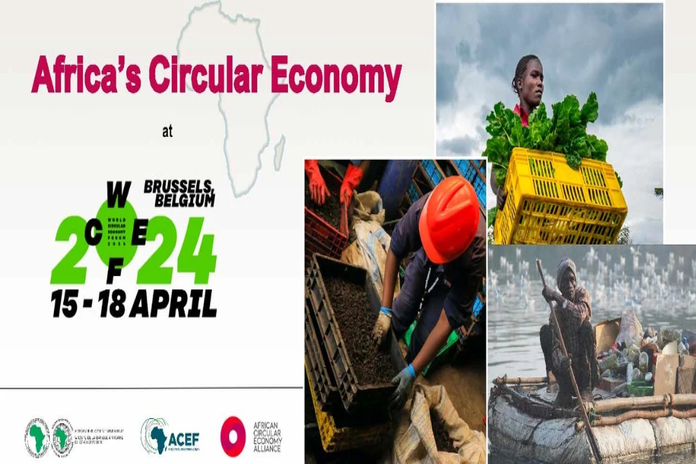AFRICA – In the face of the triple crisis of climate change, pollution, and biodiversity loss, Africa finds itself at a pivotal moment. As it seeks to advance towards a green and sustainable future, the continent finds itself increasingly key to advancing the global climate action agenda. As a result, the urgent need to shift to a circular economy has never been more critical, and the African Development Bank, through the Africa Circular Economy Facility (ACEF) and the African Circular Economy Alliance (ACEA), is at the forefront of these efforts.
At the World Circular Economy Forum (WCEF) held in Brussels from April 15 – 18, the two bank-supported entities emphasised Africa’s crucial role in the global shift towards circular economy and outlined strategic measures to fast-track this vital transition.
Represented by principal programme coordinator for ACEF Davinah Milenge and Margaret Kamau, ACEA task manager, they presented Africa’s perspectives on the importance of the circular economy and the continent’s unique context during several sessions.
During the event plenary, titled “Turning Circular Visions to Action, “The African Development Bank’s Dr Al-Hamndou Dorsouma joined Vivianne Heijnen, the Netherlands’ Minister for the Environment, and Ambroise Fayolle, European Investment Bank vice-president, to address an audience of nearly 1,500.
Dr Dorsouma, who represented the bank group’s director for Climate Change and Green Growth Anthony Nyong, declared; “Support for Africa’s circular transition is now more than ever a dire necessity, not a choice. This is a worldwide and urgent matter.”
With Africa’s population projected to double to 2.5 billion by 2050 and 83 percent of its countries heavily reliant on natural resources for revenue and economic growth, the continent’s future steps could either bolster global climate efforts or set them back, depending on whether emissions profiles resemble those of countries such as Botswana or Egypt, which produce comparable levels of greenhouse gas emissions annually.
ACEF’s interventions underscored actionable strategies to accelerate circular transformation in Africa, complemented by ACEA’s insights on the continent’s specific context. ACEF presented some of these strategies during a session titled “Bridging Borders: Financing the Circular Economy with Promotional Banks” and through other engagements.
These strategies entail a three-pronged approach to driving a systemic circular transformation across all levels, the need for tailored financial solutions and sectoral support to meet Africa’s unique needs, and close collaboration among stakeholders to align and reinforce the continent’s circular economy goals. This will require backing ACEA’s work and aligning with the African Union’s Circular Economy Action Plan.
ACEA, along with the ministry for foreign affairs of Finland, led the “Does Location Matter for the Energy Transition?” and “Enhancing Circularity in Africa’s Mining Sector,” sessions, which highlighted the continent’s vast mineral reserves that account for 30 percent of the world’s supply.
Milenge said, “Africa’s decisions will have far-reaching implications across the globe, necessitating the empowerment of the continent to make sustainable choice with its critical minerals”
ACEF is the only multi-donor trust fund dedicated to mainstreaming circular economy in Africa. ACEA spurs Africa’s transition to a circular economy at the country, regional and continental levels by operating as a collaborative platform to coordinate and link initiatives across the continent.
The annual World Circular Economy Forum (WCEF), a global initiative of Finland and Sitra, the Finnish Innovation Fund, presents the world’s leading circular economy solutions with business leaders, policymakers and experts participating from around the world.





